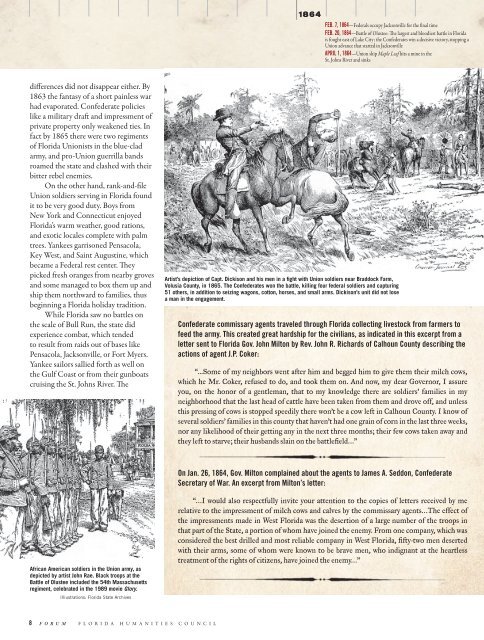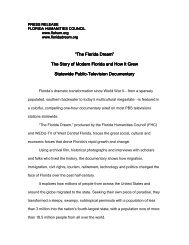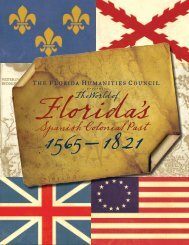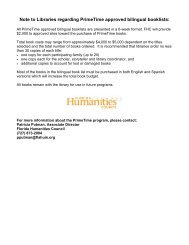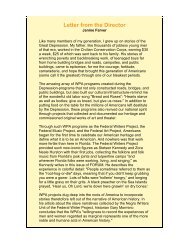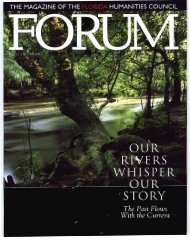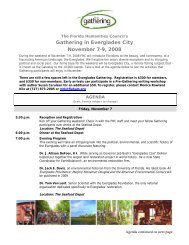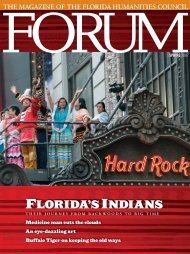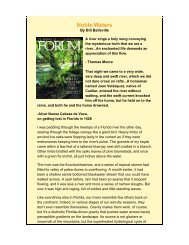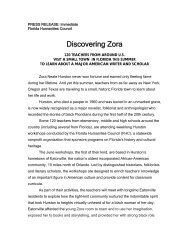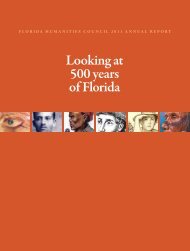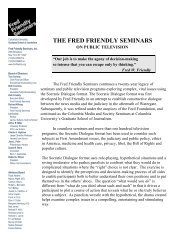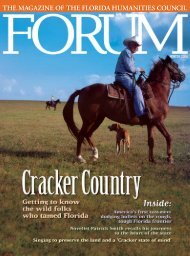when florida “Opened up the gates of hell” - Florida Humanities ...
when florida “Opened up the gates of hell” - Florida Humanities ...
when florida “Opened up the gates of hell” - Florida Humanities ...
You also want an ePaper? Increase the reach of your titles
YUMPU automatically turns print PDFs into web optimized ePapers that Google loves.
differences did not disappear ei<strong>the</strong>r. By<br />
1863 <strong>the</strong> fantasy <strong>of</strong> a short painless war<br />
had evaporated. Confederate policies<br />
like a military draft and impressment <strong>of</strong><br />
private property only weakened ties. In<br />
fact by 1865 <strong>the</strong>re were two regiments<br />
<strong>of</strong> <strong>Florida</strong> Unionists in <strong>the</strong> blue-clad<br />
army, and pro-Union guerrilla bands<br />
roamed <strong>the</strong> state and clashed with <strong>the</strong>ir<br />
bitter rebel enemies.<br />
On <strong>the</strong> o<strong>the</strong>r hand, rank-and-file<br />
Union soldiers serving in <strong>Florida</strong> found<br />
it to be very good duty. Boys from<br />
New York and Connecticut enjoyed<br />
<strong>Florida</strong>’s warm wea<strong>the</strong>r, good rations,<br />
and exotic locales complete with palm<br />
trees. Yankees garrisoned Pensacola,<br />
Key West, and Saint Augustine, which<br />
became a Federal rest center. They<br />
picked fresh oranges from nearby groves<br />
and some managed to box <strong>the</strong>m <strong>up</strong> and<br />
ship <strong>the</strong>m northward to families, thus<br />
beginning a <strong>Florida</strong> holiday tradition.<br />
While <strong>Florida</strong> saw no battles on<br />
<strong>the</strong> scale <strong>of</strong> Bull Run, <strong>the</strong> state did<br />
experience combat, which tended<br />
to result from raids out <strong>of</strong> bases like<br />
Pensacola, Jacksonville, or Fort Myers.<br />
Yankee sailors sallied forth as well on<br />
<strong>the</strong> Gulf Coast or from <strong>the</strong>ir gunboats<br />
cruising <strong>the</strong> St. Johns River. The<br />
African American soldiers in <strong>the</strong> Union army, as<br />
depicted by artist John Rae. Black troops at <strong>the</strong><br />
Battle <strong>of</strong> Olustee included <strong>the</strong> 54th Massachusetts<br />
regiment, celebrated in <strong>the</strong> 1989 movie Glory.<br />
Illiustrations: <strong>Florida</strong> State Archives<br />
8 F O R U M F L O R I D A H U M A N I T I E S C O U N C I L<br />
1864<br />
FEB. 7, 1864—Federals occ<strong>up</strong>y Jacksonville for <strong>the</strong> final time<br />
FEB. 20, 1864—Battle <strong>of</strong> Olustee: The largest and bloodiest battle in <strong>Florida</strong><br />
is fought east <strong>of</strong> Lake City; <strong>the</strong> Confederates win a decisive victory, stopping a<br />
Union advance that started in Jacksonville<br />
APrIl 1, 1864—Union ship Maple Leaf hits a mine in <strong>the</strong><br />
St. Johns River and sinks<br />
Artist’s depiction <strong>of</strong> Capt. Dickison and his men in a fight with Union soldiers near Braddock Farm,<br />
Volusia County, in 1865. The Confederates won <strong>the</strong> battle, killing four federal soldiers and capturing<br />
51 o<strong>the</strong>rs, in addition to seizing wagons, cotton, horses, and small arms. Dickison’s unit did not lose<br />
a man in <strong>the</strong> engagement.<br />
Confederate commissary agents traveled through <strong>Florida</strong> collecting livestock from farmers to<br />
feed <strong>the</strong> army. This created great hardship for <strong>the</strong> civilians, as indicated in this excerpt from a<br />
letter sent to <strong>Florida</strong> Gov. John Milton by rev. John r. richards <strong>of</strong> Calhoun County describing <strong>the</strong><br />
actions <strong>of</strong> agent J.P. Coker:<br />
“...Some <strong>of</strong> my neighbors went after him and begged him to give <strong>the</strong>m <strong>the</strong>ir milch cows,<br />
which he Mr. Coker, refused to do, and took <strong>the</strong>m on. And now, my dear Governor, I assure<br />
you, on <strong>the</strong> honor <strong>of</strong> a gentleman, that to my knowledge <strong>the</strong>re are soldiers’ families in my<br />
neighborhood that <strong>the</strong> last head <strong>of</strong> cattle have been taken from <strong>the</strong>m and drove <strong>of</strong>f, and unless<br />
this pressing <strong>of</strong> cows is stopped speedily <strong>the</strong>re won’t be a cow left in Calhoun County. I know <strong>of</strong><br />
several soldiers’ families in this county that haven’t had one grain <strong>of</strong> corn in <strong>the</strong> last three weeks,<br />
nor any likelihood <strong>of</strong> <strong>the</strong>ir getting any in <strong>the</strong> next three months; <strong>the</strong>ir few cows taken away and<br />
<strong>the</strong>y left to starve; <strong>the</strong>ir husbands slain on <strong>the</strong> battlefield…”<br />
On Jan. 26, 1864, Gov. Milton complained about <strong>the</strong> agents to James A. Seddon, Confederate<br />
Secretary <strong>of</strong> War. An excerpt from Milton’s letter:<br />
“…I would also respectfully invite your attention to <strong>the</strong> copies <strong>of</strong> letters received by me<br />
relative to <strong>the</strong> impressment <strong>of</strong> milch cows and calves by <strong>the</strong> commissary agents…The effect <strong>of</strong><br />
<strong>the</strong> impressments made in West <strong>Florida</strong> was <strong>the</strong> desertion <strong>of</strong> a large number <strong>of</strong> <strong>the</strong> troops in<br />
that part <strong>of</strong> <strong>the</strong> State, a portion <strong>of</strong> whom have joined <strong>the</strong> enemy. From one company, which was<br />
considered <strong>the</strong> best drilled and most reliable company in West <strong>Florida</strong>, fifty-two men deserted<br />
with <strong>the</strong>ir arms, some <strong>of</strong> whom were known to be brave men, who indignant at <strong>the</strong> heartless<br />
treatment <strong>of</strong> <strong>the</strong> rights <strong>of</strong> citizens, have joined <strong>the</strong> enemy…”


